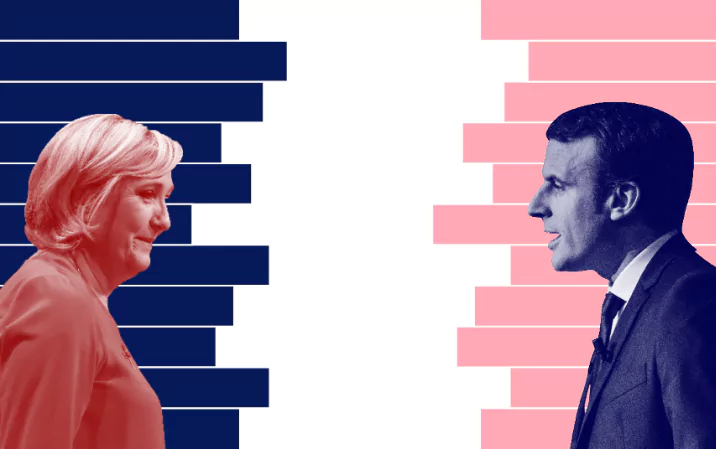
Continuing with my series “Lessons from Abroad” we’re going to explore the French Presidency. I will admit this was not going to be my planned second post, but such is life, as the French say…
…actually, I’ve never heard a single French person say this.
French Presidential Elections
If you’ve ever wanted to know about how the French elect their presidents, you’ve come to the wrong place. You’re better off reading this. This article isn’t about how the French elected their president, but rather about who the French elected as president and who they didn’t.
Emmanuel Macron is a pro-EU centrist who ran, in his own words, as being “neither left nor right.” He took 65% of the vote against Marine Le Pen, a far-right populist who, in her own words, is “very tolerant and hospitable person, like you” but then went on to say she wouldn’t want twelve illegal immigrants moving into the apartment next door and stealing your wallpaper (seriously, she said this). Le Pen was anti-EU and part of the Front National Party. If she had won, she most certainly would have pulled France from the EU and effectively put an end to it (coupling it with the loss of Britain). Her policies have been described as nationalistic, anti-immigrant and ran on the platform of employing citizens over outsiders, with a focus on the working class.
Macron is an independent, who was not supported by any major party in the current race. He never held elected office (he was the current Socialist president’s economy minister), mostly an unknown, and is currently France’s youngest president (the second-youngest was the nephew of Napoleon Bonaparte).
Turnout for the vote this year was at a 40 year low. Most of his supporters were college-age, educated youth. And though he has ties to the current president, the biggest reasons for his rise and victory are because of his platform: free market, pro-business, but decidedly left when dealing with social issues and immigration.
Macron’s win (or rather, Le Pen’s loss) came as a welcome relief in the EU. In a strange twist (though I bet, not a coincidence) Macron’s campaign was hacked by what intelligence officials call “foreign entities.”
What We Can Learn
Up front, this needs to be known: Macron is not a Libertarian. He’s not a socialist, either, but he’s certainly not a Libertarian. He believes in government intervention; not to the extent of his opponents from other parties, but he certainly isn’t for complete hands-off.
Still, Macron’s number one concern and platform policy was free markets to solve economic issues. As an economist, he is pro-business, but does not seem to believe government can fix business woes (though that definitely remains to be seen). This excited voters in France due to dissatisfaction with the current Socialist agenda (their words, not mine) and not wanting to resort to nationalism like with Le Pen. It shows an enthusiasm, especially now, for something new.
His base of support speaks to a lot to current state of affairs around the globe and in America. American voters, especially young ones, are dissatisfied with the dual-party system. Bernie Sanders, whether you like him or not, excited the young, the college-age and the independents while Trump, also whether you like him or not, spoke to people who felt disenfranchised. These common threads run through elections world-wide and show that should Libertarian-ism speak to those looking for a third option, it could very well become a growing movement. Libertarians need to seek out those who are looking for a different choice and are willing to listen. Appealing to economics, morality, and especially through discussion instead of the bluster we’ve seen in the past elections, could be the key to that.
But in the French election, something else happened that didn’t happen in American elections. Trump ran as a populist; that is, ran on a platform about the ordinary working person. Bernie Sanders ran a similar campaign, albeit from the other side of the aisle. Both Trump and Sanders were outsiders (or at least seen to be) and as such had an up-swell of support. Many pundits, political thinkers and commentators point out that the rise of both candidates could be traced back to anger amongst people and dissatisfaction with the establishment. Le Pen was in the same vein. However, Le Pen lost due to Macron using common-sense business logic, economics and an appeal against nationalism. Libertarians in the age of Trump could do the same and should do the same.
Follow Up
There is still a dissatisfaction with Democrats in our country, as seen by recent Congressional elections. The reaction of Democrats chanting “nah nah nah, hey, hey, good-bye” to Republicans after the passing of the last healthcare bill was met with derision by even liberals, as it shows a cavalier attitude they detest. Libertarians could, at local, state and even federal levels, offer a different, more mature party. It remains to be seen.
Many French voters received envelopes in the mail which contained 2 Macron ballots and no Le Pen ballot while other voters received envelopes with a perfectly intact Macron ballot but a torn Le Pen ballot. Torn ballots are considered invalid and are disqualified.
http://powderedwigsociety.com/le-pen-macron1/#
LikeLike